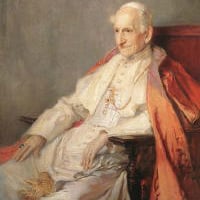Regina Caeli – Queen of Heaven, Rejoice!
The Regina Caeli, Latin for “Queen of Heaven,” is a hymn and prayer ...

Pope Leo XIII, baptized Gioacchino Pecci, was born to a noble family in Carpineto, Italy in 1810. He entered the seminary where he studied under famous Roman theologians such as Perrone and earned a doctorate in theology in 1832, being ordained to the priesthood in 1837. He was consecrated Archbishop in 1843 and sent as papal nuncio to Brussels, Belgium in 1843 where he remained until his appointment as Bishop of Perugia where he dedicated himself to the renewal of priestly formation, mandating the study of the philosophy and theology of St. Thomas Aquinas. His goal was to encourage true holiness and sound preaching among his clergy. In 1877, Pope Pius IX called him to Rome to assume the duties of the Cardinal Camerlengo. The following year, Pius IX died and the conclave chose Cardinal Pecci to succeed him. Taking the name Leo XIII, Cardinal Pecci began a vigorous papacy that lasted until 1903. During this time his teaching laid the groundwork for the theological renewal of the 20th and ultimately for the great work of the second Vatican Council. Pope Leo XIII was a pioneer in Catholic social teaching with his Encylical Rerum Novarum, addressing issues of economics and social justice. His great encyclical Providentissimus Deus gave great encouragement to Catholic Biblical studies. Other encyclicals encouraged the movement of seeking the restoration of Christian Unity, particularly with the Orthodox Churches of the East, greater devotion to the Holy Spirit, and the recovery of the philosophic and theological heritage of the Angelilc Doctor, St. Thomas Aquinas. He was succeeded by Pope St. Pius X in 1903.
Biography by Dr. Italy